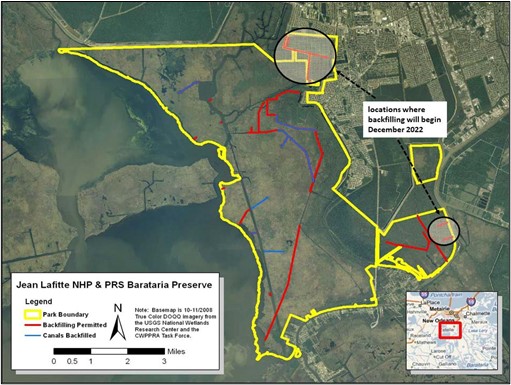News Release

NPS
|
Subscribe
|
Contact: Guy Hughes, (504) 512-2558
NEW ORLEANS — Jean Lafitte National Historical Park and Preserve will begin the next phase of their efforts to backfill 12.75 miles of canals and their spoil deposits within the Barataria Preserve to restore more natural hydrology (Figure 1). The construction is planned to run from December 8 through May of 2023, and the public can expect to encounter a spud barge and marsh buggies throughout the project area. Funding for this project is provided from penalties resulting from the Deepwater Horizon oil spill through the Gulf Coast Ecosystem Restoration Council. The project is an extension of similar work conducted in the Preserve in 2001 and 2010.“We are excited to continue restoring more natural hydrology at the Preserve by backfilling canals,” stated JELA ecologist Dr. Julie Whitbeck. “We anticipate this project will improve wetland and waterway health and resilience to increasing salinity and storm energy. We look forward to sharing what we learn by monitoring the environmental and ecological outcomes of this project with interested stakeholders and coastal stewards.”
The canals that will be restored were built beginning in the mid-1800s, before the creation of the park. As the canals were dredged, the excavated soil and vegetation were placed along the sides of the canals, which created spoilbanks and upland habitat that now hosts invasive species like tallow.
By restoring more natural topography and hydrologic connections, the project will allow non-historic canals and spoil banks to revert to marsh, swamp, and shallow water habitat, thereby enhancing wetland health and increasing the resiliency of park ecosystems to subsidence, sea level rise, and storm events.
The park is completing baseline monitoring of current environmental conditions and plans post-backfilling monitoring that will enable rigorous assessment of this restoration project’s environmental and ecological outcomes.
The Barataria Preserve, located 17 miles south of New Orleans, is comprised of over 26,000 acres of Louisiana deltaic wetlands, including bottomland hardwood forest, cypress swamp, freshwater and intermediate marshes, bayous, and canals. The wetlands are among the most biologically productive ecosystems in North America. The preserve's floating marshes are one of only four large estuarine floating freshwater marsh systems in the world. The preserve reflects thousands of years of human interaction and cultural heritage of southern Louisiana. Each year, over 450,000 visitors enjoy the Preserve’s trails, canoe waterways and programs that inspire stewardship of the natural and cultural resources of southern Louisiana and the many challenges they face.
Last updated: December 1, 2022
